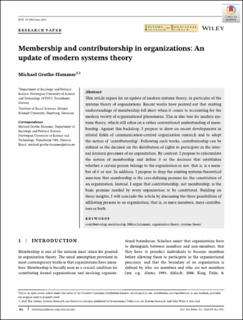| dc.contributor.author | Grothe-Hammer, Michael | |
| dc.date.accessioned | 2021-05-18T12:30:40Z | |
| dc.date.available | 2021-05-18T12:30:40Z | |
| dc.date.created | 2020-09-04T21:33:19Z | |
| dc.date.issued | 2020 | |
| dc.identifier.citation | Systems research and behavioral science. 2020, 37 (3), 482-495. | en_US |
| dc.identifier.issn | 1092-7026 | |
| dc.identifier.uri | https://hdl.handle.net/11250/2755495 | |
| dc.description.abstract | This article argues for an update of modern systems theory, in particular of the systems theory of organizations. Recent works have pointed out that existing understandings of membership fall short when it comes to accounting for the modern variety of organizational phenomena. This is also true for modern systems theory, which still relies on a rather conventional understanding of membership. Against this backdrop, I propose to draw on recent developments in related fields of communication‐centred organization research and to adopt the notion of ‘contributorship'. Following such works, contributorship can be defined as the decision on the distribution of rights to participate in the internal decision processes of an organization. By contrast, I propose to reformulate the notion of membership and define it as the decision that establishes whether a certain person belongs to the organization or not, that is, is a member of it or not. In addition, I propose to drop the existing systems‐theoretical assertion that membership is the core‐defining premise for the constitution of an organization. Instead, I argue that contributorship, not membership, is the basic premise needed by every organization to be constituted. Building on these insights, I will conclude the article by discussing the three possibilities of affiliating persons to an organization, that is, as mere members, mere contributors or both. | en_US |
| dc.language.iso | eng | en_US |
| dc.publisher | Wiley | en_US |
| dc.rights | Navngivelse 4.0 Internasjonal | * |
| dc.rights.uri | http://creativecommons.org/licenses/by/4.0/deed.no | * |
| dc.title | Membership and contributorship in organizations: An update of modern systems theory | en_US |
| dc.type | Peer reviewed | en_US |
| dc.type | Journal article | en_US |
| dc.description.version | publishedVersion | en_US |
| dc.source.pagenumber | 482-495 | en_US |
| dc.source.volume | 37 | en_US |
| dc.source.journal | Systems research and behavioral science | en_US |
| dc.source.issue | 3 | en_US |
| dc.identifier.doi | 10.1002/sres.2683 | |
| dc.identifier.cristin | 1827502 | |
| dc.description.localcode | This is an open access article under the terms of the Creative Commons Attribution License, which permits use, distribution and reproduction in any medium, providedthe original work is properly cited.© 2020 The Author. | en_US |
| cristin.ispublished | true | |
| cristin.fulltext | original | |
| cristin.qualitycode | 1 | |

